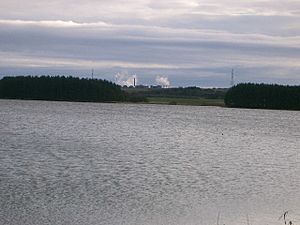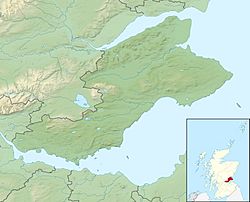Loch Ore facts for kids
Quick facts for kids Loch Ore |
|
|---|---|
 |
|
| Location | Fife, Scotland |
| Coordinates | 56°08′45″N 3°20′52″W / 56.1458°N 3.3478°W |
| Type | freshwater loch |
| Basin countries | United Kingdom |
| Surface area | 260 acres (110 ha) |
Loch Ore is a freshwater loch (which is the Scottish word for a lake) located in Fife, Scotland. It's a popular spot for fun activities and is a central part of the Lochore Meadows Country Park. People mostly use the loch for exciting leisure activities.
Contents
A Place for Fun and Sports
Loch Ore is a fantastic place for many outdoor activities. It's especially popular for yachting and other water sports. The depth of the loch can change, which means some activities like speed boating might be tricky. However, it's still a great place for many other water adventures.
Training Ground for Athletes
Many sports teams use Loch Ore for their training. For example, the University of St Andrews Boat Club practices here. The loch hosts several exciting events throughout the year.
Scottish Open Water Championships
One of the biggest events is the annual Scottish Open Water Championships. Swimmers compete in long-distance races. They swim 5 km, 2 km, and even a 4×1 km relay race. It's a thrilling event to watch!
Saints Regatta
Another important event is the Saints Regatta. This rowing competition takes place in September. Students from the University of St Andrews Boat Club organize and run this event.
History of Loch Ore
Loch Ore has a very interesting past. It wasn't always the same size or in the exact same spot it is today.
Roman Times
Long ago, around 83 A.D., a famous Roman general named Agricola set up his winter camp near Loch Ore. This was shortly after the Romans had invaded Britain. He stayed here before heading north for a big battle.
Draining and Returning
In the 1790s, the loch was actually drained. This means the water was removed. The landowner, Captain Park, wanted to use the land for farming. But his plan didn't work very well. The area stayed wet and muddy, so it wasn't good for growing crops.
Over time, the loch slowly came back. This happened in the mid-20th century. At that time, the area around Lochore Meadows was a coal mine. As coal was mined, the ground above it sometimes sank. This sinking, called subsidence, caused water to collect again. The "new" loch formed in a slightly different place than the original one. Today, the loch's water level is stable, but its depth can still change a bit. The small islands you see in the loch are actually parts of an old railway track that used to serve the coal mine!


